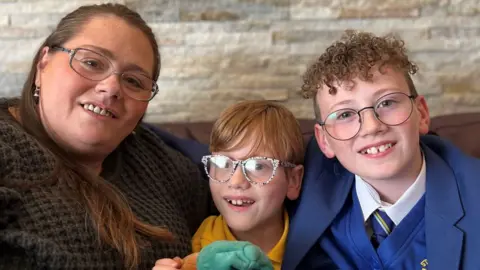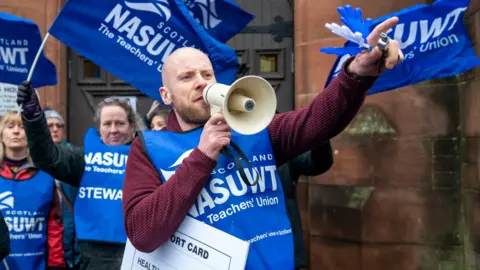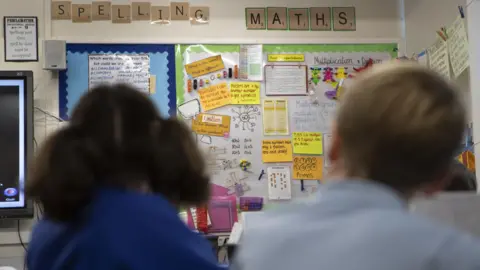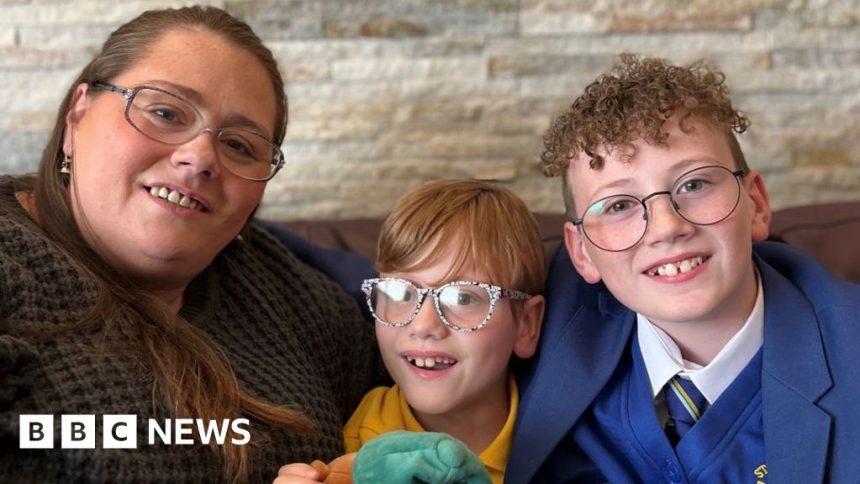‘More school cuts will break the children or teachers – or both’
 BBC
BBCLee-Anne King has three sons at schools in Glasgow.
They all have additional support needs – and, as a result, are among those most likely to be affected by cuts to teacher numbers across the city.
Lee-Anne, 41, volunteers at a primary school in the Knightswood area and is also the chair of the parent council.
She says the impact of the teacher cuts is already visible in the classroom at the school, which her 10-year-old son JJ attends.
“Last week our deputy headteacher ended up teaching a class all day because another teacher was off,” she told BBC Scotland News.
“These cuts mean there is no flexibility in the system so if one teacher goes off sick your management team have to step in and teach.
“That means all the work they should be doing – including assessments for additional needs, meetings with parents, and support for kids with additional needs – goes out the window.
“There is not enough support as it is and now they are cutting it to the bone and expecting schools to pull off miracles, but more cuts are going to break the children or the staff – or both.”
Lee-Anne’s youngest son, seven-year-old Austin, attends a school for children with special educational needs. Thirteen-year-old Carter is at a mainstream secondary school.
Lee-Anne says one-to-one support groups for children with dyslexia and other additional support needs are already disappearing in the city, along with school trips for children who might not otherwise have the opportunity.
Glasgow City Council has already cut 172 teaching staff across its schools as part of its plans to cut 450 posts over three years.
An equality impact assessment carried out by the council in June suggests there will be “no significant impact” on children – but also contradicts itself and concedes that those in the poorest areas, and those who previously received targeted interventions, may suffer.
It says that while Glasgow has 10% of the Scottish population, it is home to 35% of the children who live in the country’s most deprived areas.
“A reduction in teaching staff may have a detrimental impact on the poorest children and young people,” it states.
“Targeted intervention groups may be less likely to operate which previously targeted those children performing below the expected level for their age.”
 PA Media
PA MediaTeaching unions are now balloting their members in Glasgow on strike action, with the result due by the end of September.
But Glasgow is not the only council to be making education cuts.
Edinburgh is consulting on cuts of £10m to its education budget – including reductions in staff – and Falkirk is looking at shortening its school week. Under the proposals, pupils would do 22.5 hours instead of 25 each week and go home at lunchtime every Friday.
Edinburgh’s proposed cuts include introducing strict caps on how much schools can spend on printing, copying and stationery; reducing the number of staff responsible for monitoring and improving the quality of education; and slashing the budget available for school transport for pupils with additional needs.
The Scottish government has warned Glasgow City Council – and other local authorities – that they face losing their share of the £145.5m pot of money specifically earmarked for maintaining teacher numbers if they do make cuts. However, ministers have not confirmed whether or not that will definitely happen.
Glasgow’s education cuts are expected to save £7m, but losing out on government funding could cost the council an estimated £16m – so why do it?
Mike Corbett, national Scottish official of the NASUWT union, says it is a game of chicken between the government and the councils – a game where the children and teachers will be the losers.
“What puzzles us is why the cabinet secretary is not front and centre making that final decision and saying to Glasgow you cannot go ahead with this and if you do you will not receive this funding.
“It is almost like some sort of game of chicken where they are just seeing how far the other side will go.
“However, teacher numbers have already been cut. It is too late to be sitting around. We need that decision and we need it now.”
He said other councils across the country were waiting to see what happened – and that pupils with additional support needs would be the most impacted.
That was echoed by the EIS union, which warned that life chances for the most vulnerable pupils would be “devasted – with a huge impact for years to come”.

Lee-Anne says the children and their families are likely to be the ones to miss out.
“They go on and on about their [Scottish government] policy of Getting It Right For Every Child but they are not getting it right for these kids and then they’re making further cuts,” she said.
“There is an impact on the kids who don’t have additional support needs as well.
“A lot of children are going to leave school never having been to a museum, never having learned to swim. There is going to be a rise in kids at school struggling with their mental health because of the lack of time for teachers to offer support, and some kids will just leave school altogether.”
She believes the council thinks it will not be held to account and will not lose out on the funding aimed at maintaining teacher numbers.
“They do it because have been allowed to do what they want for so long and no one challenges them,” she added.
Lee-Anne says she understands the council has to balance its books, but argues that it should instead look at postponing or stopping projects like the £10m regeneration of George Square.
 PA Media
PA MediaGlasgow City Council said it would do everything possible to minimise any impact on schools, but that it had to look at every option as it attempted to save £108m over the next three years.
“We know that this will be a worrying time for everyone – for many years education spending has been prioritised, relative to other services, in the budget process,” said a spokeswoman.
“However, with the education budget now amounting to more than half of service expenditure directed by the council, it is significantly more challenging to protect education when substantial savings are needed.”
A spokesperson for local government body Cosla recognised the “vital role” of teachers but said progress could not be made by focusing on them alone.
“Investment is required in wider support that may well sit outside the classroom and indeed the school.
“It is for this reason that we are concerned about the approach of the Scottish government to date around the £145.5m for teacher numbers, which does not enable a holistic focus on improving outcomes.”
A Scottish government spokesman said it was committed to protecting teacher numbers.
“We are offering local authorities over £145m for that purpose,” he said.
“Talks are continuing with Cosla to reach an agreement which ensures that teacher numbers are protected, and we would strongly encourage any council planning teacher cuts to reconsider.”







